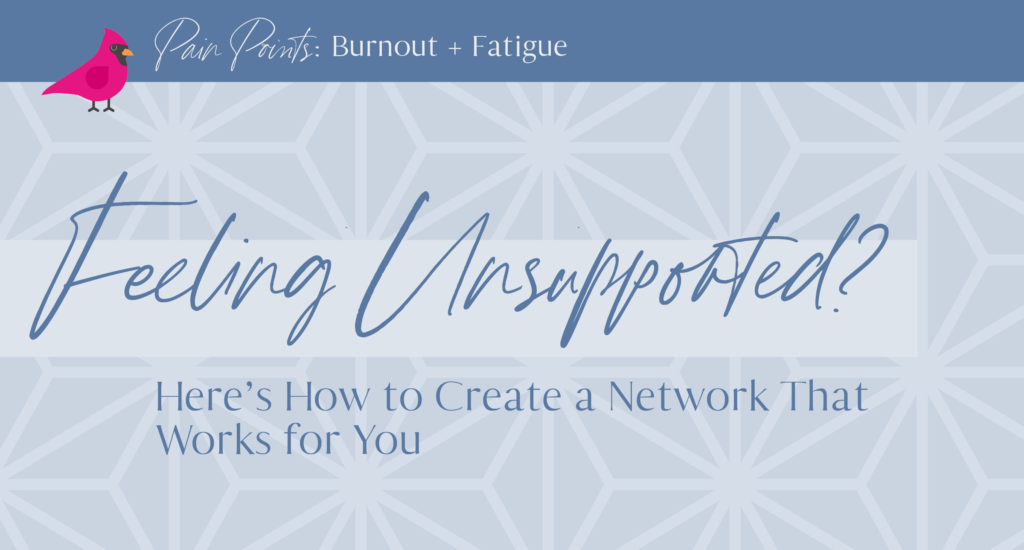
Lack of support at work is no joke. Whether it’s missing guidance from leadership or feeling isolated from your peers, that sense of being on an island can quickly turn into burnout and stress. The good news? There are both organizational strategies and personal practices you can implement to change this. Let’s talk about how to foster a supportive, collaborative environment and what you can do to feel more connected and empowered.


Action: Encourage teamwork! Get employees working together on projects, sharing ideas, and building strong working relationships. Set up regular team meetings, brainstorming sessions, and cross-departmental initiatives to keep the flow of communication going.
Why It Helps: Collaboration builds community. When people feel part of a team with shared goals, isolation fades, and everyone starts pulling together.

Action: Managers, this one’s for you. Regular one-on-one check-ins aren’t just for performance reviews—they’re a chance to connect. Use these moments to discuss progress, challenges, and well-being. Recognize achievements, give constructive feedback, and show employees that you’re invested in their success.
Why It Helps: These check-ins show employees that leadership cares. It builds trust and keeps everyone feeling valued and heard.

Action: Pair up newer employees with seasoned pros through mentorship or friend-at-work programs. It’s an easy way to build connections, offer guidance, and make sure no one feels like they’re figuring everything out solo.
Why It Helps: Mentorship provides a safety net—employees feel more confident, supported, and connected from day one.

Action: Create a culture where employees feel comfortable speaking up. That means encouraging them to share ideas, ask for help, or voice concerns—without the fear of judgment. And as a leader, be open about company goals, decisions, and changes. Transparency builds trust!
Why It Helps: Open communication fosters a sense of belonging. When people feel safe to speak their minds, they become more engaged and feel part of a supportive community.

Action: Offer employees resources like Employee Assistance Programs (EAPs), mental health support, and opportunities for professional development. The more you invest in their growth and well-being, the more supported they’ll feel.
Why It Helps: Resources and training empower employees to take control of their careers and well-being, which builds a sense of trust and loyalty to the organization.


Action: Don’t wait for connections to come to you—take the initiative! Reach out to colleagues, attend events, and join professional groups. The more you build your network, the more supported you’ll feel.
Why It Helps: A strong network means you’ve got people to turn to for advice, collaboration, or even just a pep talk when you need it. It’s your built-in support system.

Action: Be proactive—seek out feedback from peers and supervisors. If something’s unclear or you’re feeling lost, ask for help. Don’t wait until you’re overwhelmed.
Why It Helps: When you take the lead on seeking clarity, you’ll feel more aligned with team goals and expectations. Less uncertainty, less stress.

Action: Don’t assume people know how you’re feeling. If you’re struggling, overwhelmed, or simply feeling unsupported, speak up! Let your manager or team know what’s going on so you can work together on solutions.
Why It Helps: Clear communication builds stronger connections and ensures you get the support you need—before things get too heavy.

Action: Advocate for yourself by setting boundaries, asking for what you need, and recognizing your achievements. Don’t be afraid to highlight your contributions and speak up for your professional growth.
Why It Helps: Self-advocacy is empowering. When you take charge of your career, you’re actively building the support structure you need to succeed.

Action: If you’re feeling unsupported, it’s easy to get caught up in negative thinking. Instead, focus on what’s in your control and shift your perspective. Engage in positive self-talk, focus on small wins, and practice gratitude.
Why It Helps: Reframing negative thoughts builds resilience and helps you stay grounded in tough situations. It’s about finding strength in what’s going well, even when things feel challenging.

Addressing a lack of support in the workplace is a two-way street. Leaders need to foster a culture that’s inclusive and collaborative, but employees can also take steps to build their own network of support. By combining organizational initiatives with personal strategies, we can create a work environment where everyone feels valued, heard, and connected.
Feeling unsupported? You don’t have to go through it alone. Take the first step by communicating your needs and building your support system. Together, we can prevent burnout and create a healthier, more collaborative workplace.

Leave a Reply